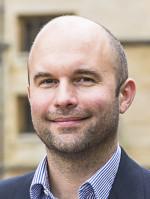
Professor of Molecular Informatics
Currently also: Chief Informatics and Technology Officer (CITO) at Pangea Botanica, London/UK and Berlin/Germany
Previous positions:
Director Digital Chemistry at NUVISAN Berlin
Associate Director Computational ADME and Safety (Clinical Pharmacology & Safety Sciences/Data Science and Artificial Intelligence - CPSS/DSAI) at AstraZeneca Cambridge
Co-founder of Healx Ltd.
Co-founder of PharmEnable Ltd.
- Committed to developing new life science data analysis methods (AI/ML/data science) and their application, primarily related to chemical biology, drug discovery and in silico toxicology
- Expertise comprises data ranging from chemical structure and gene expression data to phenotypic readouts and preclinical information, applied to both efficacy- and safety/tox-related questions
- Collaborating with academic research groups, as well as pharmaceutical, chemical, and consumer goods companies (Eli Lilly, AstraZeneca, GSK, BASF, Johnson&Johnson/Janssen, Unilever, ...)
- Co-founder/founding CTO and current SAB member of Healx Ltd. (data-driven drug repurposing for rare diseases, and beyond); co-founder of PharmEnable Ltd.; SAB member of Lhasa Ltd. (toxicology and metabolism prediction) and Cresset Ltd.
- Coordinator of the Computational & In Silico Toxicology Specialty Section of the British Toxicology Society (BTS)
- Steering Committee Member of the Cambridge Alliance on Medicines Safety (CAMS)
- Currently leading a group of ca. 15 PhD students, postdocs, project students and visitors at the Centre for Molecular Informatics at the University of Cambridge, https://www-cmi.ch.cam.ac.uk/centre-molecular-informatics
Publications
Evaluation guidelines for machine learning tools in the chemical sciences
– Nat Rev Chem
(2022)
6,
428
(doi: 10.1038/s41570-022-00391-9)
A systems genomics approach to uncover patient-specific pathogenic pathways and proteins in ulcerative colitis.
– Nature Communications
(2022)
13,
2299
(doi: 10.1038/s41467-022-29998-8)
Targeting Cell Death Mechanism Specifically in Triple Negative Breast Cancer Cell Lines
– Int J Mol Sci
(2022)
23,
4784
(doi: 10.3390/ijms23094784)
Augmented Hill-Climb increases reinforcement learning efficiency for language-based de novo molecule generation
(2022)
(doi: 10.26434/chemrxiv-2022-prz2r)
Prediction of In Vivo Pharmacokinetic Parameters and Time–Exposure Curves in Rats Using Machine Learning from the Chemical Structure
– Molecular pharmaceutics
(2022)
19,
1488
Latent Variables Capture Pathway-Level Points of Departure in High-Throughput Toxicogenomic Data.
– Chem Res Toxicol
(2022)
35,
670
Deriving waveform parameters from calcium transients in human iPSC-derived cardiomyocytes to predict cardiac activity with machine learning
– Stem cell reports
(2022)
17,
556
(doi: 10.1016/j.stemcr.2022.01.009)
Integrating Cell Morphology with Gene Expression and Chemical Structure to Aid Mitochondrial Toxicity Detection
– biorxiv
(2022)
2022.01.07.475326
(doi: 10.1101/2022.01.07.475326)
DDREL: From drug-drug relationships to drug repurposing
– Intelligent Data Analysis
(2022)
26,
221
(doi: 10.3233/ida-215745)
Using Artificial Intelligence for Drug Repurposing
(2022)
2022-January,
147
(doi: 10.1039/9781839163401-00147)
- <
- 5 of 42
